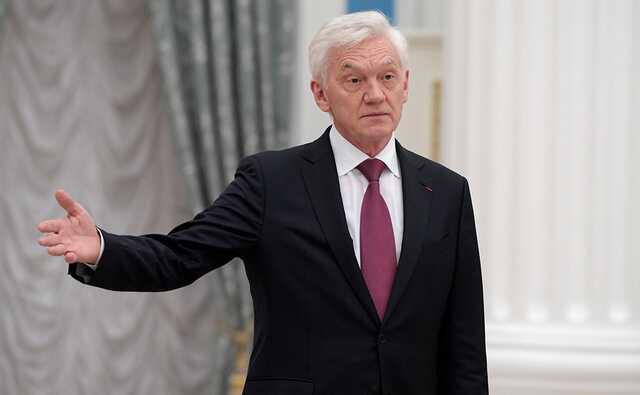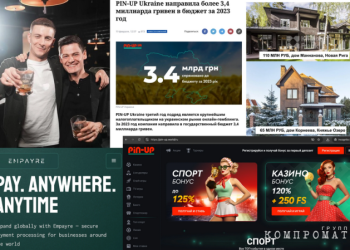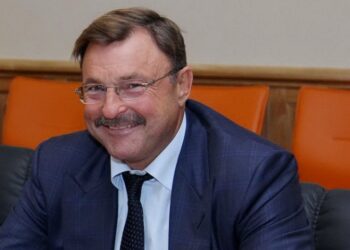At the end of last year, the business press drew attention to a very strange deal, the mechanism of which none of the participants could clearly explain.
We are talking about the sale of a 29.9% stake in the mining company IRC Limited, which they managed to resell twice more within a month. IRC Limited (Kimkano-Sutarsky GOK in the Far East) was formed 12 years ago on the basis of the iron ore assets of the infamous gold mining company Petropavlovsk.
In early December last year, Petropavlovsk sold a 29.9% stake in IRC Limited for $10 million to the Swiss company Stoken Board AG (the market value of this stake in IRC at that time was about $65 million). The formal pretext for selling shares at such a surprisingly low price was “the release of Petropavlovsk from IRC loan guarantees to Gazprombank.” At the same time, Petropavlovsk sells the remaining 1.2% stake in IRC Limited to UCP Industrial Holdings Limited for $2.24 million, that is, already at the market price (six times more expensive than the Stoken Board). The largest shareholder of Petropavlovsk, Yuzhuralzoloto Group of Companies, Konstantin Strukov (UGK), sharply opposed the sale of shares of the IRC Limited Stoken Board.
On November 30, UGK filed an application for interim measures in the High Court of England and Wales demanding that Petropavlovsk hold an extraordinary general meeting of shareholders, as well as prohibit management from taking any steps to sell a stake in IRC before the meeting. On December 2, the court rejected the UGK’s petition, and the next day Stoken Board AG became the owner of the 29.9% stake in IRC Limited.
However, a week later this stake was bought from the Stoken Board by Gazprombank (through its offshore company Cerisier Ventures Limited) and businessman Dmitry Bakatin for $30 million, who on December 30 resold the shares again for $96 million. The final buyer was Axiomi Consolidation, about which absolutely nothing was known until that moment. After a tenfold increase in the cost of the package in less than a month, even more questions arose about the deal.
Levitsky is well remembered in Khanty-Mansi Autonomous Okrug, where one of the successful oilfield service companies went bankruptKhanty-Mansiysk Autonomous Okrug Government
In mid-January, KPMG released an audit report stating $302.4 million in troubled Petropavlovsk transactions (up from $157 million in the preliminary June auditors’ report). The rapid doubling of suspicious transactions is due to the transaction with Stoken Board AG, which turned out to be the strangest in a series of non-obvious transactions of Petropavlovsk. Many questions arise about the company – the ultimate purchaser of the stake in IRC Limited. The new owner, the Cypriot offshore Axiomi Consolidations, was registered less than a year ago. Nikolay Levitsky is called the beneficiary of Axiomi Consolidation in official documents on the disclosure of information about the deal. Many people in the Urals and in the north of Tyumen are familiar with this surname.
Comrade Gaiser
Nikolai Levitsky has a remarkable biography. He was born in St. Petersburg, where he graduated from the University of Economics and Finance. After graduating in 1994, he immediately found a job as the chairman of the board of KomiBank (which was already declared bankrupt in 1996). Then he moved to Komi TEK, from there to Imperial Bank, after which he returned to the oil industry – he was appointed vice president for economics and finance at Slavneft.
The acquaintances of the businessman explain Levitsky’s so rapid career by the fact that at that time he was married to the daughter of the general director of Komi TEK, Valentin Leonidov (in 1994, all oil and gas assets of the republic were united in Komi TEK).
This was followed by positions in several commercial companies, including Eurochem, where Levitsky was even listed as the head of the holding for some time. In 2003, Nikolai Levitsky returned to Komi, where he found a job as a vice-governor under the head of the republic, Vladimir Torlopov (Torlopov’s successor, Vyacheslav Gaizer, was arrested in 2015 and then sentenced on charges of corruption to 11 years in a strict regime colony and a fine of 160 million rubles, arrested at the same time, the court sentenced Torlopov to 6.5 years of general regime and a fine of 500 thousand rubles).
By the way, according to our information, Mr. Gaiser is now in one of the Moscow pre-trial detention centers, and not in a colony, where investigators are working with him on new charges, and it is possible that Levitsky’s former boss will receive an additional term in addition to the 11 years previously received.
Sources in the investigation say that immediately after the arrest, solid sums began to come to help Gaiser, which were spent on expensive Moscow lawyers. Investigators of the republican department of the FSB, which was then headed by General Alexander Kalashnikov (who later became the director of the Federal Penitentiary Service, was dismissed at the end of last year) are of the opinion that Nikolai Levitsky, a good friend of Vyacheslav Gaiser, was behind the financial support (Gaizer once worked at KomiBank) ). They believe that these transactions could hardly be explained by the friendly desire of a colleague to help the boss in difficult times and, quite possibly, the expenses of hundreds of thousands of dollars were explained by some kind of compensation for the silence about Levitsky’s activities in the civil service.
northern case
Nikolai Levitsky is familiar to many production workers in the Tyumen region, Khanty-Mansiysk Autonomous Okrug and beyond, through the CJSC Geotech Holding, created with credit funds, on the basis of which IG Seismic Services (IGSS) was formed. Geotech Holding, and then IGSS, were among the largest domestic companies in the market of geological exploration and oilfield services. For some time, 25% of Geotek (and then IGSS) were owned by Gennady Timchenko’s Volga Resources, who then sold them. Another 51.5% belonged personally to Mr. Levitsky.
Recall that in the summer of 2017 it became known that the key shareholder and head of the company, Nikolai Levitsky, was forced to leave the oilfield services business, having sold (or, according to one version, given to creditors) his share, which was estimated by experts at $3.4 million. By that time, IGSS’s debts amounted to approximately 20 billion rubles. Sources familiar with the process of “alienation” of Levitsky’s share say that the main creditors of the holding were the Otkritie group and Sberbank, and only thanks to the collaboration of these large financial and industrial groups did they manage to return at least some of the funds previously provided in the form of loans to Levitsky associates.
The oilmen remember Geotech Holding not so much for its economic successes, but for its constant lawsuits for non-payment of taxes for tens and hundreds of millions of rubles, non-payment of salaries and various frauds. So, the once successful Sibneftegeofizika under the control of Geotek went bankrupt in 2016, leaving 684.4 million rubles due to Sberbank. A criminal case was initiated against the head of Sibneftegeofizika for non-payment of wages in the amount of 185 million rubles.
But the biggest scam was the non-repayment of loans by the Agan-Bureniye enterprise, which is part of Geotek. In 2010-2012, Sberbank issued loans to the company for a total of 957 million rubles and accepted the company’s contractual revenue as collateral. However, part of the contracts turned out to be fictitious, and the debt of counterparties to Agan-Bureniy was doubled “on paper”, from 600 million to 1.2 billion rubles. Of the almost billion dollar debt, 174 million rubles were paid to Sberbank, after which in 2013 Agan-Bureniye was sold to CJSC Investment Alliance and went bankrupt. Then the bankers and the bankruptcy trustee of “Agan-Burenia” suspected that the structures of “Geotech Holding” used forged documents when obtaining a loan. Sberbank turned to law enforcement agencies with a statement about fraud, but suddenly the debts of Geotek in the amount of almost 800 million rubles, with the tacit consent of the management of the West Siberian Bank of Sberbank of Russia, were bought out by a certain LLC Alta Management Company for 100 million rubles. Evgeny Makushkin, at that time the bankruptcy trustee of Agan-Burenia, found out that the funds in Alta Management Company through an intermediary company (immediately liquidated after the transaction) came from Geotek Holding, and Nikolai Levitsky bought his own debt of 790 million rubles for 100 million rubles.
Kvass is not cola for Nikola
Immediately after the Sberbank loan vanished into thin air in 2013, Nikolai Levitsky acquired control over CJSC Deka from Veliky Novgorod. At that time, the Deka plant, a manufacturer of beer and other carbonated and soft drinks, was among the leaders in the industry and was estimated at $200 million, the company’s revenue reached 2.7 billion rubles a year.
Nikolai Levitsky ended up with Deca just as sadly as with Geotech Holding. In April 2021, the company is declared bankrupt with a total debt of about 3 billion rubles. Before the bankruptcy of Deka, Levitsky tried to get rid of the shares of the enterprise, offering to transfer them to the creditor bank with one condition – to forgive him about 100 million rubles of debt on a personal loan. However, during the audit of Deka JSC, dubious operations of the owner and former director of the enterprise were revealed, about which the creditors sent an appeal to the Prosecutor General’s Office. According to their estimates, the withdrawal of funds from the accounts of Deka JSC amounted to at least 500 million rubles (the document is at the disposal of the editors).
The same thing happened on Deka as in Geoteka. At first, things were going well, the beginning of the collapse of the enterprise coincided with the termination of Levitsky’s income from Geotek. For example, in 2016, Deka JSC, at the direction of Nikolai Levitsky, bought shares in two companies from the Cyprus offshore and General Invest LLC for 125.7 million rubles, which were 10 thousand rubles each on the balance sheet of the sellers, and the purchased companies themselves did not conduct any activity and had no assets, except for unknown and unused trademarks. During the bankruptcy process, it turned out that part of the funds from transactions from the account of the Cyprus offshore were withdrawn to the personal accounts of Nikolai Levitsky. The authors of the appeal to law enforcement agencies indicate that Levitsky does not even deny that all of the above companies were under his control.
Now, the Moscow-based Innova Finance LLC, affiliated with Levitsky, bought the rights of claim for 400 million rubles from small creditors of Deka JSC for 20-25% of the nominal value. Despite the fact that Levitsky himself in every possible way denies his connection with Innova, the Innovafinance.Ru domain is registered by his company Axiomi Consolidations. And now Deka’s bankruptcy trustee Maxim Lagoda is preparing the plant for sale as a single lot, so that the mortgage creditors cannot keep the property pledged by Deka, and Innova Finance gets the entire property complex. A scheme for buying your own debts at a huge discount, which is painfully familiar from the situation with Agan-Bureniye.
The shadow of “father” Timchenko
Market specialists say that such transactions (like Petropavlovsk with IRC) simply do not happen: usually, in this way, management withdraws assets in favor of some buyer to the detriment of shareholders. The presence of Levitsky in the deal additionally suggests that everything is not entirely clean (judging by his previous entrepreneurial path). Therefore, the answer to the question of how the deal was actually carried out by the offshore subsidiary of Gazprombank (whom this “daughter” worked for), who was behind the deal, whether real money was paid for IRC (with a premium of 25% to the exchange value of shares), and no.
According to the interlocutors of Znak.com, it cannot be ruled out that behind Levitsky there is a shadow of his former partner in Geotech Holding, Gennady Timchenko. After all, if Nikolai Levitsky really had such amounts at his disposal, then he would hardly have tried to present himself as a “simple face value” and not the real owner of the enterprise during the trials for Deka. And it is quite possible to act as a face value in favor of someone who is under tough Western sanctions.










